Not too long ago, I visited the old southern city of Savannah, Georgia. It’s a fairy tale place, whose seven large city squares, dating to the American Revolution, are shaded by giant oaks draped with Spanish moss.
And Savannah is even more special to millions of America’s women and girls. It was in this hot and humid coastal city, 100 years ago this coming March, that the Girl Scouts of USAwas founded and the organization’s first members sent off to do good deeds.
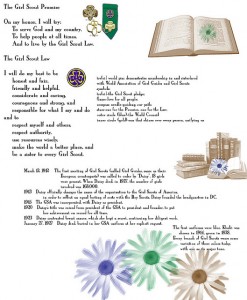
Many Girl Scouts are not just good citizens but also good artists. (Carla216, Flickr Creative Commons)
In Savannah I discovered that much has changed about girl scouting — and much remains the same.
Girl Scouts still raise their right hands and swear:
“On my honor, I will try:
“To serve God and my country,
“To help people at all times,
“And to live by the Girl Scout Law.”
This pledge, and the “law” to which it refers, were written by the scouts’ founder, a remarkable woman named Juliette Gordon Low.
“Juliette, our guiding star,” the scouts sing to this day.
Shining down from where you are.
For every girl who follows on the stardust of your dreams.
Scouts ages 10 through 17 (and younger members called “Brownies”) visit Low’s 1720-vintage mansion in Savannah as a pilgrimage to the cradle of Girl Scout values, including self-reliance, self-confidence, and community service. Katherine Keena, program manager at the Low birthplace, told me that the woman who framed those values was all the more inspiring because she spread the Girl Scout gospel in a world that was nearly silent to her. She lost the hearing in one ear after a doctor injected silver nitrate into it to treat an infection.
“And then a grain of the good-luck rice thrown at her wedding was caught in her good ear,” Keena continued. “And the doctor, when he tried to remove the grain of rice, punctured her eardrum.”
“Daisy” Low, as her family liked to call her, was the adventuresome daughter of a wealthy cotton broker. But the fun stopped when she married a rich Englishman, William Mackay Low, and moved to his home in London.
In stuffy Victorian fashion, he not only wanted her to stay at home hosting socialite parties, he also forbade her even to venture out of the house to do charity work.
“I have a wasted life,” she wrote in her diary. “My life brings forth nothing but leaves.” So she began making regular and prolonged visits back to America, in part to see friends and in part just to explore the country.
In 1911, six years after her husband died, Daisy Low met Robert Baden-Powell, a British military officer who had founded a scouting organization for boys.
“Well, 6,000 girls showed up at the first rally of the Boy Scouts,” Katherine Keena told me. “Up to that point, when he was asked, ‘Can girls join, too?’ he said, ‘I don’t see any reason why not.’
“But he didn’t really understand that girls were going to love it. And in fact, in England, love it better than the boys did.”
So Baden-Powell urged his sister to start an organization called the “Girl Guides,” and Daisy Low quickly got involved, leading Girl Guide companies in England and Scotland. There would be no more “wasted life” for her.
Then Low sailed home, arriving in Savannah on March 12th, 1912. She immediately got on the telephone — not an iPhone, I assure you — and called a cousin.
As Keena relates it, Daisy Low said, “‘Come right over. I’ve got something for the girls of Savannah and all of America and all of the world. And we’re going to start it tonight.”
Not that evening, but a few days later, the first 18 Girl Scouts were sitting around Low in her home, chattering about the hikes, camping trips, homemaking projects, and good works to come.
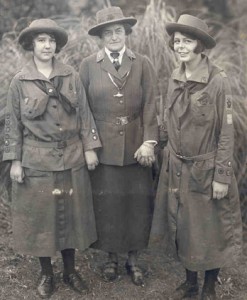
Juliette Low and two scouts, about 1914. I hope it was winter in Savannah when this was taken! (Wikipedia Commons)
Juliette Gordon Low believed that girls should have fun, but that they need to grow strong and confident and to explore fields of study beyond homemaking and nursing. Master a trade, she advised girls, so that you will be independent. This was heady stuff for 1912, when cultured southern girls, especially, were “delicate flowers,” taught to obey their fathers and husbands.
The Girl Scout idea exploded into the fabric of American culture. In less than a month in Savannah, there were more than 100 girls in troops called patrols. And thanks to Daisy Low’s contacts — and incessant travels throughout the nation — the idea spread quickly beyond Georgia.
Part of the reason: the girls were being trained to be self-sufficient, and along came World War I, when many fathers were off to war, mothers took their place in factories and fields, and the nation needed girls — and boys — to be self-reliant.
By 1920, eight years after their founding, the Girl Scouts could claim more than 168,000 members. Today, they count 2.3 million girls and 880,000 adult volunteers of both sexes.

The Low house, a scouting shrine. (Eric Prine, Attic Fire)
When Carol and I were in Savannah, so were Girl Scouts from across the nation, visiting the Low birthplace. Among them, 14-year-old Brittany Lesher from Casper, Wyoming.
“We do a lot of service projects with the community,” she told me. “Like we did a Meals on Wheels thing, delivering meals to shut-ins in the Casper area. And we helped out at the Salvation Army. We do that, like, twice a month.”
I asked her what had interested her in Girl Scouts.
“I wasn’t really interested,” she told me. “My mom kind of made me be in it. But I’m glad she did.”
Early Girl Scout service projects in the days of Daisy Low — this was more than half a century before the women’s liberation movement — included babysitting so that older women could go to vote, often for the first time. In those days girls learned prudent skills such as telegraphy, cooking, and baking.
Ah, yes, baking! The scouts’ famous Girl Scout Cookies were baked as early as 1917 to support troop activities. They were simple sugar cookies back then, sold door to door for 25 or 30 cents a dozen. Now, they come in a host of decadent flavors, some drizzled with caramel and coconut and chocolate.
Girl Scouts once earned badges for such domestic accomplishments as keeping their clothing in good repair, going to bed by 9:30 on school nights, and avoiding parties that might interfere with schoolwork.
And they learned about a “healthy lifestyle” and “healthy habits.” Squeaky clean ones, you can be sure.

Katherine Sullivan views the earth from the Shuttle Challenger in 1984. She looks a lot like Amelia Earhart, doesn't she? (NASA)
The leadership skills to which they once aspired, however, are no longer an abstract concept. As an example: Dr. Kathryn Sullivan, who had been an avid Girl Scout as a child, became not only an astronaut but also the first American woman to walk in space, in 1984.
But Daisy Low might have needed smelling salts if she encountered some of today’s Girl Scouts — the ones with tattoos or purple hair. None of her charges was African American, either. Girl Scout troops were originally segregated by race in the southern states, and there wasn’t a single “colored” troop there until one was formed in Richmond, Virginia, in 1932.
Many Girl Scouts today admit that the most meaningful scout activities are not building campfires or canoeing on lakes — or even memorizing the Girl Scout Law:
I will do my best to be
Honest and Fair,
Friendly and Helpful,
Considerate and Caring,
Courageous and Strong, and
Responsible for what I say and do,
And to respect myself and others,
respect authority,
use resources wisely,
make the world a better place, and
be a sister to every Girl Scout.
A lot of scout activities center on what the girls call “chilling.” Marsha Evans at the Girl Scouts’ national headquarters in New York told me that means more than just hanging out with trusted troop leaders. It means talking about the pressures, temptations, and opportunities of modern life.
Some of these are media-driven — these idealized figures on TV or in magazines that might even have had some computer enhancement. And then, when they raise questions [at home] — particularly about sexuality, about boys, about appearance — because they’re still seven, eight, nine years old, and adults perceive that girls of that age should not be so interested in such things — they say things like, “Well you’re too young.” And that’s the end of it. They’re left to figure things out on their own.
We were particularly concerned that girls were telling us that adults weren’t listening to them.
In 2000, as part of a new emphasis on research into issues affecting girls and young women, the Girl Scouts of the USA published a study of more than 1,000 pre-teen girls called “Teens Before Their Time.”
Its conclusion: that while girls are undeniably maturing faster physically and mentally than a generation or two ago, they often lack the emotional skills to deal with this acceleration into adulthood.
Yet the Girl Scout slogan, to “Do a Good Turn Daily,” hasn’t changed.
As for that promise to “serve God and my country”:
Some critics assailed it as unwelcoming to nonbelievers. So nine years ago, Girl Scout leaders across the country voted, 1,560-375, to allow Scouts to substitute “wording appropriate to their own spiritual beliefs for the word ‘God’” when reciting the pledge.
And two years earlier, fending off further criticism that scouting was “non-inclusive,” the Girl Scouts of the USA, in New York, declared that it “respects the values and beliefs of each of its members and does not intrude into personal matters. Therefore, there are no membership policies on sexual preference.”
It made it clear, however, that sexual “displays” or advocacy of a particular sexual lifestyle are not permitted or condoned.
In 2012, scouting’s centennial year, Girl Scouts and their parents and supporters will have something special to carry around or save for their successors and descendants: more than 350,000 silver dollar coins minted in honor of the anniversary.

This Girl Scout of today does more than bake, sew, and babysit! (Darthgriz98, Wikipedia Commons)
Ted's Wild Words
These are a few words from this posting that you may not know. Each time, I'll tell you a little about them and also place them into a cumulative archive of "Ted's Wild Words" in the right-hand column of the home page. Just click on it there, and if there's another word that you'd like me to explain, just ask!
Decadent. Naughty, morally decayed. The word can also apply to tame but “sinful” pleasures, such as enjoying a large cupcake fresh from the oven.
Incessant. Without pause; never-ending. The term is usually applied to something unpleasant, such as an incessant headache.
Prudent. Cautious, safe, undertaken with great care.


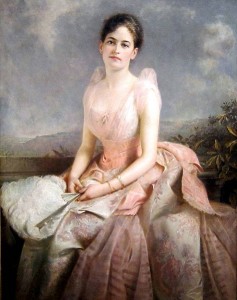
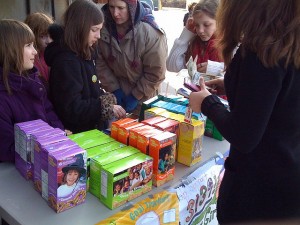
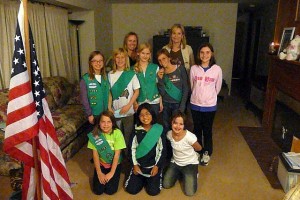


2 responses to “Scout’s Honor”
[…] American, either. Girl Scout troops were originally segregated by race in the … Read more on Voice of America (blog) . Written by Posted in Some Girls Tagged with Girls, Latest, News, […]
could u please tell me where I could sign all 5 of my girls